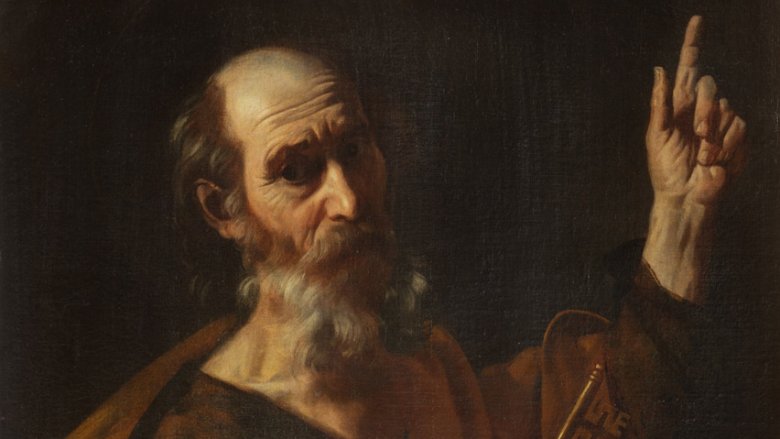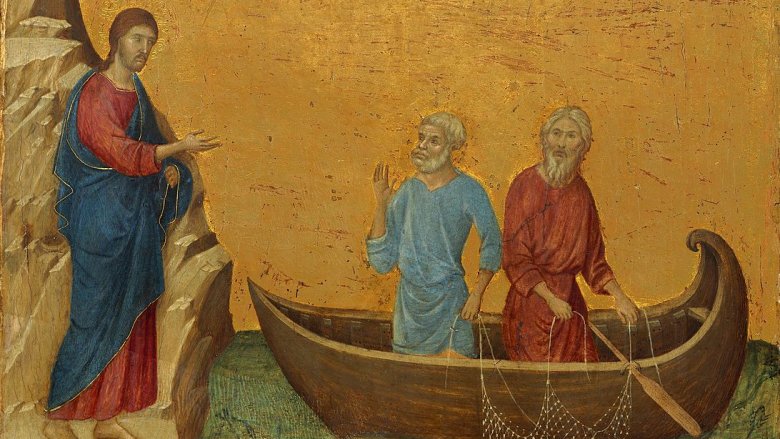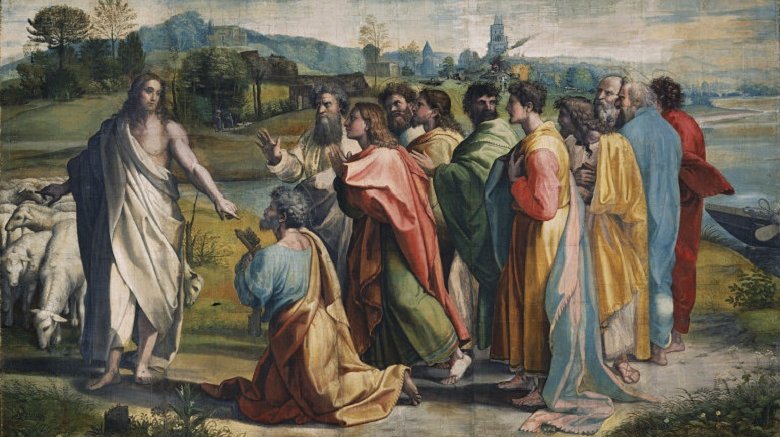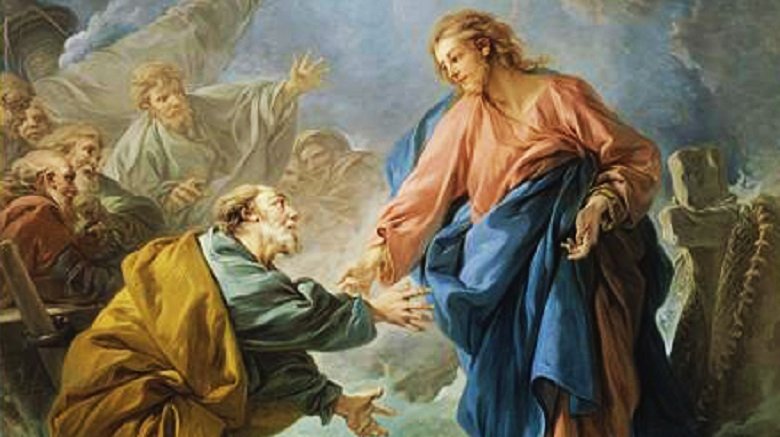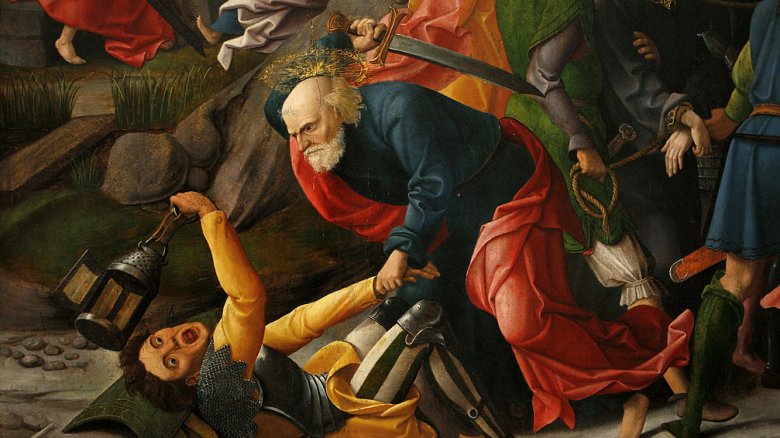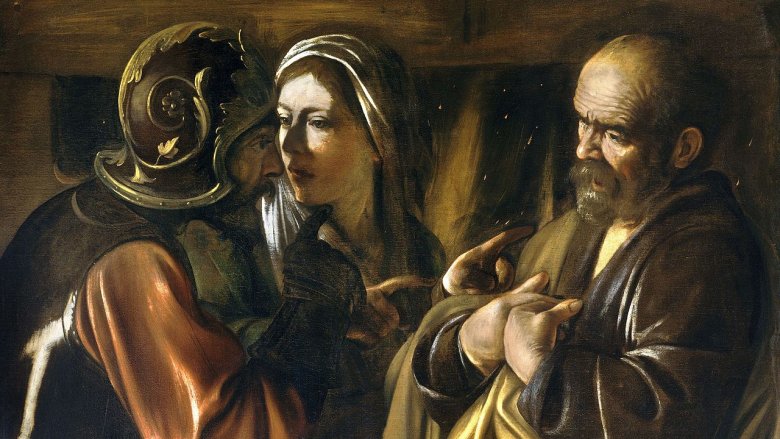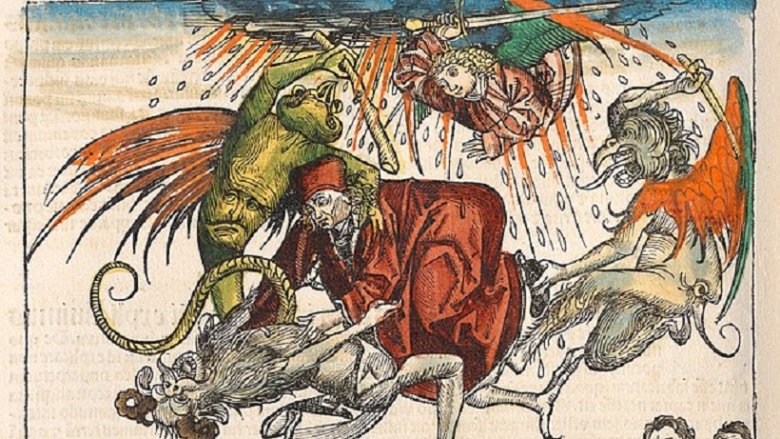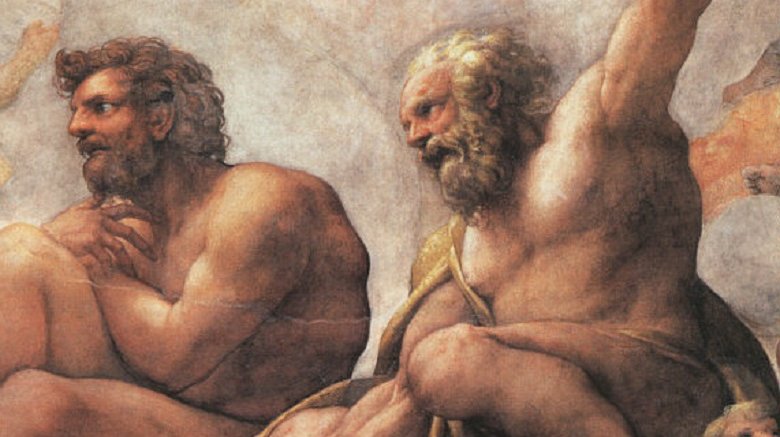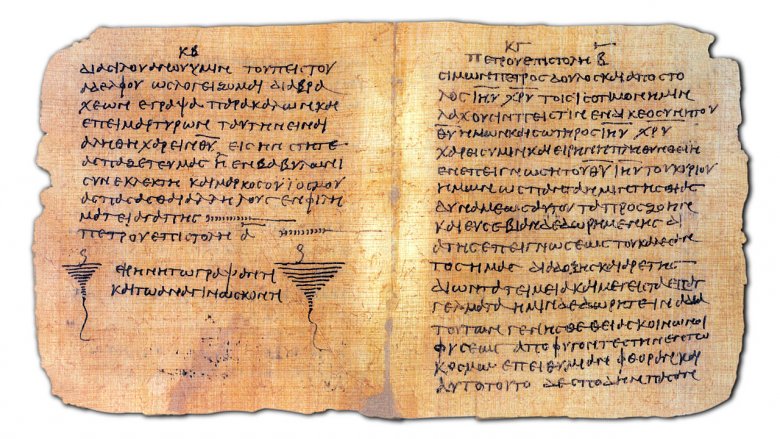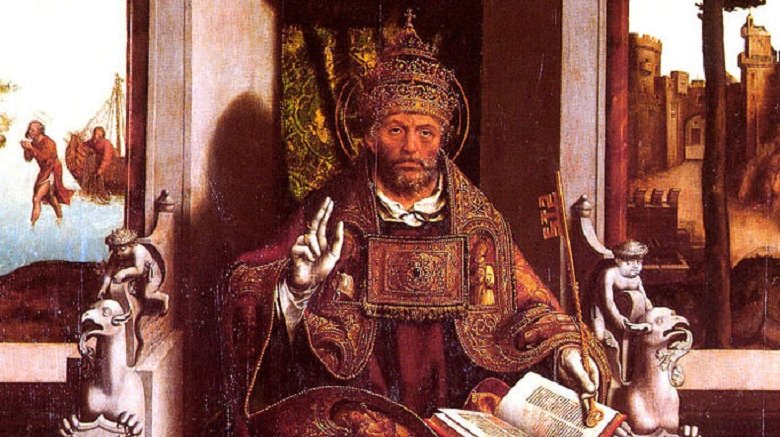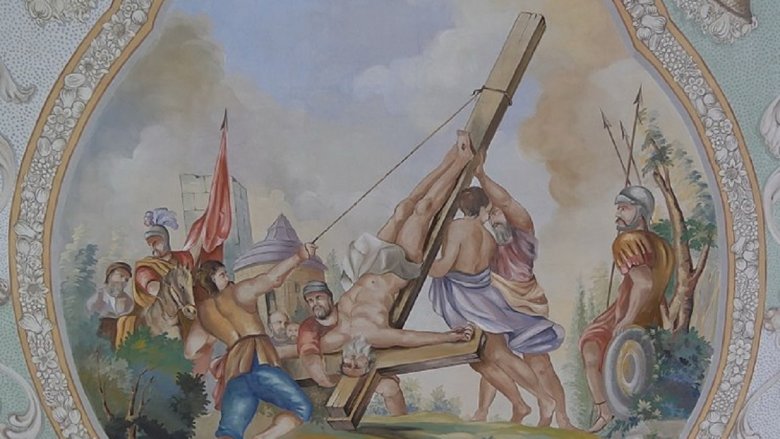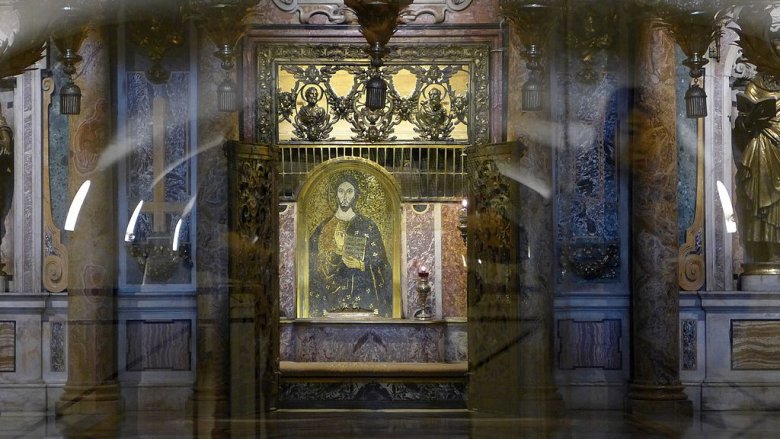The Untold Truth Of St. Peter
These days, St. Peter is mostly known as a guy who has a Basilica in Rome and a Burg in Russia, but he's actually one of the most important people in the New Testament. That doesn't mean he led some boring, pious life, though. Even his official story in the Bible is crazy detailed and multi-layered, with the complex Peter a main character in some of the holy book's most exciting moments. But once you start looking at his unofficial legend and archaeological evidence about his life and death, the official story gets even crazier.
Being pope now might involve living in a giant mansion and driving around behind bulletproof glass, but when Jesus made Peter the first pope, he was ensuring his life was going to be hard, dangerous, and almost certainly end in a horrible death. Yet it also somehow involved talking dogs and intense debates about circumcision. Peter was a lot more complicated than you'd think.
Peter gave up a lot to follow Jesus
When Peter meets Jesus for the first time, the story varies a little from one Gospel to the other, but basically Peter is fishing with his brother Andrew. Jesus tells them to drop their nets and come with him because he's going to have them fish for people instead. And Peter does, just like that. But the Bible and modern archaeology tell us a lot about just what he was leaving behind.
Many Christians have an idea that the disciples were poor before they started wandering around with Jesus. But Peter, at least, was probably doing pretty well for himself. From the various Gospels we learn he had at least three employees, his own boat, and a house big enough to accommodate some extended family.
We also know the town he was from, and archaeologists believe they found it, but National Geographic points out that headlines saying diggers had discovered his exact house were inaccurate. Ancient Bethsaida appears to have been a thriving urban settlement with elements of posh Roman culture, extremely significant in a place that was then generally a backwater of the empire. So Peter could afford to live somewhere nice.
Peter also had family, although who and how many is less clear. The Bible tells us Jesus healed Peter's mother-in-law of a fever, which means he must have been married and there could easily have been children, but if he did leave them behind to follow Jesus, his immediate family never gets a mention.
He was obviously the leader of the disciples
But where he comes from and how he made his living is just the beginning of what we know about Peter. When it comes to the disciples, Peter is unquestionably the most important. All four Gospel writers give him the most coverage by far. According to the Encyclopedia Britannica, across all of the New Testament, Peter is mentioned by name over 200 times. (The next most talked about disciple is John, who gets a mere 29 name drops.)
Of course, that name varied wildly. Peter isn't really Peter in the beginning. His name is originally Simon, or sometimes it's spelled Simeon (the Hebrew version of a Greek name). Then Jesus comes along and names him Petros, meaning "rock," except he really names him Kepa, because they spoke Aramaic, not Greek. This in turn is changed to Kephas (Greek) and Cephas (Latin). Or sometimes his names get slammed together and he becomes Simon Peter. It's more than a little confusing that the Bible can't settle on one name for him, considering he's one of the stars.
Whatever Simon/Peter/The Rock went by, he was definitely the leader of the disciples. Whenever the 12 are listed across four different books, Peter always gets mentioned first. More than that, the Gospels agree that he "served as spokesman, [was] the outstanding member of the group, and enjoyed a certain precedence over the other disciples." He's even chosen to be the first male follower who witnesses the resurrection (although Mary Magdalene got the real honor).
Peter is super important and a total screw-up
Even within the Twelve Disciples, there was a super group of just three or four who got selected to be a part of the most important events, and closer to Jesus in general. Peter was one of those lucky few. And Jesus even selects him to be the one to build the church after he goes to heaven. That's extra strange since the Gospels paint Peter as an argumentative screw-up.
According to the BBC, Peter is always asking Jesus questions and arguing with him. If Peter doesn't understand what Jesus is talking about, he isn't afraid to say it. And it doesn't always make him look great, since "he is rash, impetuous, and even foolish at times." Peter is even the recipient of Jesus' sickest burn, when he tells his follower to "Get behind me, Satan!" when Peter once again says the totally wrong thing.
And he doesn't always show great faith in the guy he believes is the Messiah. One incident finds the disciples in a boat. Jesus starts heading out toward them (the famous walking on water story) and instead of recognizing him, they think it's a ghost. When Jesus says who he is, Peter is all, "Oh yeah? If it's really you then let me walk on water, too." Peter starts walking on water just fine, but then he begins to doubt, freaks out, and sinks, so Jesus has to save him. It's just one example of the many times Peter gets it seriously wrong.
Peter goes total badass in the Garden of Gethsemane
Another time Peter messed up completely was when Jesus was arrested. After the Last Supper, the group goes to the Garden of Gethsemane to pray. The traitor Judas shows up with armed guards. But one of the disciples, identified as Peter in John 18:10, who wasn't going down without a fight, whips out a sword and cuts off the ear of some random unarmed servant.
This, as the Jewish-Christian Intersections blog points out, is "one of the strangest stories in the New Testament." And unlike many Gospel stories, it's included in all four books, with just a few different details. Even the basics, one pastor writes, make no sense: Jesus was very specific that his disciples shouldn't carry anything of value with them, not even an extra tunic or sandals. But suddenly one of them has a sword? Not to mention that Peter was a fisherman by trade, not the kind of person you'd expect to know how to use a sword at all. Plus, a Jew carrying a weapon would have been against both Jewish and Roman law at the time. And swinging it at someone's head/causing bodily harm was definitely illegal. Yet Peter doesn't get arrested or killed on the spot?
Religion Prof says when the books were written, early Christians were trying to promote themselves as nonviolent revolutionaries. So if it didn't happen, why make the story up? And even if it did happen, why did every Gospel writer include it if Peter made them look bad? Big shrug.
He was all I don't know him about Jesus
But almost killing a guy wasn't the end of Peter being Peter that night. According to Thought Co., at the Last Supper, Jesus not only told his disciples that one of them would betray him, but that the rest of them would all abandon him in his time of need. Peter steps up and says there is no way he would desert Christ, that he'd go to prison or even die for him. Jesus isn't impressed, saying Peter will deny him three times before the rooster crows in the morning.
When he attacked a guy with a sword, it seemed Peter was serious about the jail or death promise. But then things start to go downhill for him. The story is included in all four of the Gospels, although details about who he talks to vary slightly. But the gist is that Peter follows Jesus after he's been arrested and people keep recognizing him and going, "Hey! This guy knows the criminal Jesus!" and Peter cannot lie about it fast enough. Peter is all "I don't know him" about the guy he thinks is the Son of God. Then he hears the rooster and cries because he knows he screwed up.
But in John, Peter gets redeemed. When Jesus is resurrected and comes to the disciples, he asks Peter three times if he loves him, and Peter is emphatic that he does. It's supposed to show that no matter what mistakes people make, Jesus will forgive them.
Peter maybe participated in an epic miracle contest
After Jesus goes to heaven, Peter and the other disciples go off to continue his work. We know Peter in particular suddenly has the power to do amazing miracles. Acts introduces readers to a guy called Simon Magus (aka Simon the Sorcerer or Simon the Magician) who sees the disciples performing these great feats and offers to pay them to give him the same powers. Peter shuts him down, tells him to repent, and that's all we hear about Simon Magus in the New Testament.
But the apocryphal books that didn't get included in the Bible have more to say about this magician. Simon supposedly arrived in Rome by flying in on a cloud of smoke and "created a great sensation." He performed miracles in the city and started calling himself the Great Power of God. But then Peter showed up and sent a talking dog to tell Simon to cut it out. They decide the only way to settle their problems is with a good old-fashioned miracle contest in public.
Peter goes all out, raising people from the dead and exposing Simon as a fraud. To save face, Simon declares he's going to jump off the Roman Forum, in front of the Emperor Nero no less, to prove he can fly. But Peter prays for Simon to crash and he does, causing an injury that later kills him. But Simon got his time when a sect that believed he was god arose in the second century.
Peter and Paul had beef about circumcision
Peter and Paul were preaching the gospel at the same time and sometimes in the same places. But, as the Encyclopedia of World Biography puts it, "there was a difference of opinion concerning doctrinal matters" between them. Others have said there was "deep seated conflict." Basically, Biblical scholars try to politely say these two guys probably hated each other. And one thing they seriously clashed about was Christians having the snip.
Jewish men were famously circumcised, even back then. In the Old Testament, Abraham agrees to stick with God, and the sign of this special friendship is removing that loose skin. Since early followers of Jesus, like Peter, were Jews, they already had this operation. But once they started preaching to Gentiles, there was the question of whether followers of this new religion had to follow Jewish law. Sure, there were arguments about eating kosher, but most potential male converts cared more about the foreskin debate.
This was, after all, a time without sanitary surgery conditions and anesthesia. Undergoing circumcision would not only be painful but could literally kill you. But Peter was basically Jewish to the end. He didn't think Jesus fundamentally changed anything but was the Jewish Messiah, and his followers needed to be Jewish in the genitals. Paul, leaning more Christian than Jewish, didn't agree.
The pair eventually had to have a summit to resolve this. According to Galatians, they decided Peter would preach to circumcised people and Paul would minister to those who wanted to stay intact.
He totally didn't write either of the New Testament books that have his name
Two books of the New Testament, 1 Peter and 2 Peter, are supposed to be written by the apostle, but as with so many books in the Bible, the authorship of both of them is super questionable.
The New World Encyclopedia says 1 Peter was probably written extremely early because many historical figures reference it in their writings, one of them before 156 A.D. This makes it at least theoretically possible that Peter wrote it about 90 years earlier, and after all, the first line does say it's by "Peter, an apostle of Jesus." This meant no one really questioned its authorship until the 1700s. Once they did, major problems started emerging. Some are extremely technical, but the most obvious one is the epistle was originally written in an "urbane cultured style" of Greek, and a Jewish fisherman like Peter would have spoken Aramaic and a little Greek at best.
Even if Peter did write 1 Peter, he certainly didn't write 2 Peter. According to Desiring God, there is no way the two epistles were penned by the same person. They have completely different vocabulary styles, for one thing. And no one, not even the early church fathers, thought Peter wrote the second book with his name. Bible.org reports that 2 Peter is "perhaps the most dubious writing" in the New Testament. There is a convincing theory the author of Jude also wrote 2 Peter, but that author was definitely not St. Peter.
Catholics think he's extra special
Peter is considered a key guy in many religions from Protestantism to Islam. But the Catholics took his importance a major step further. They interpret a passage in Matthew to show that Peter wasn't just an important apostle, he was the guy who was going to be in complete charge after Jesus was gone.
According to Catholicism.org, Jesus tells the disciple Simon that, "Thou art Peter and upon this rock I will build my Church and the gates of Hell shall not prevail against it. And I will give to thee the keys to the kingdom of Heaven. And whatever thou shalt bind on earth, it shall be bound also in Heaven, and whatsoever thou shalt loose on earth, it shall be loosed also in Heaven." From those simple sentences grew a huge, complex organization with one guy at the head, who also happens to be infallible (under certain circumstances). Peter was followed by other popes after his death (the third one was hilariously named Cletus) and the line is considered unbroken to this day, minus some antipope drama here and there.
From the beginning, church fathers seem to have collectively accepted Jesus wanted Peter to have this special position. Catholic Answers compiled some of their writings on the subject, and they do seem pretty sure. But the Christian Research Institute, taking the Protestant view, says that while Peter might have been singled out, Jesus said nothing about "a line of apostolic succession" and that "Peter's role dies with him."
Peter might have been crucified upside-down
The Bible doesn't actually tell us what happened to Peter after he went off to preach. According to Evidence for Christianity, the only thing to go on is a very metaphorical statement Jesus makes in John that "when you grow older, you will stretch out your hands and someone else will tie you and carry you where you don't want to go." This is supposed to show that Peter, too, will be crucified, even if it is extremely vague and symbolic.
But New Advent points out that non-Biblical early church sources are unanimous in their reports that Peter was crucified, most likely in Rome. While the exact year is harder to pin down, it's generally accepted that Peter was caught up in Nero's crackdown on the budding Christians religion, starting in 64 A.D. The Telegraph reports archaeologists even have evidence they might have found the jail he was held in before execution. And if he was killed, one Christian writer says crucifixion would have been the logical punishment, since Peter, still technically a Jew, wouldn't have been considered a Roman citizen.
But the often-repeated story that he was crucified upside-down at his own request because he didn't think he was good enough to die in the same way as Jesus is harder to substantiate. Very few sources mention this detail, and while there is evidence Roman executioners sometimes "varied their crucifixion practices for their own sadistic pleasure," why would they do what a condemned prisoner asked them to?
There's a possibility the Vatican has his remains
Tradition not only says Peter was crucified in Rome, it is extremely specific about where he was supposedly buried. According to the University of Alberta, the current St. Peter's Basilica in Vatican City is built on another church from the 300s, which was built on top of a necropolis, alleged to contain the remains of St. Peter.
This was all completely theoretical for almost 2,000 years. Then in 1939, archaeologists got permission to do some digging. They found many mausoleums from the very early centuries A.D., and in a niche by the high altar they found some bones that someone put away and forgot about. When they were finally analyzed, the tests showed they were from a guy of the right age from the right time period. They also showed evidence of the remains of purple vestments. The BBC says the cherry on the cake was the ancient inscription next to the bones reading "petros emi," or "Peter is within." Despite the fact that Pope Pius XII had announced in 1950 that they'd found Peter (those remains turned out to belong to two guys, a woman, and a bunch of animals), in 1968, Paul VI made another announcement that no, seriously, this time they really found Peter. Pope Francis unveiled the bones for the first time in 2013.
But the Telegraph says that didn't stop a different Roman church from claiming they had the real remains of St. Peter, which they found in 2017. It's probably impossible to ever be sure.
